Apollo Justice: Ace Attorney Trilogy has remastered three fan-favorite Ace Attorney games for the price of one. For veterans of the series, it’s a stroll down memory lane. And for newcomers, it’s a cozy fever dream populated by a Scooby Doo-like cast of attorneys and suspects, with a corpse somewhere in the middle.
The Apollo Justice: Ace Attorney Trilogy collection contains, as the name suggests, three games: Apollo Justice: Ace Attorney, Phoenix Wright: Ace Attorney – Dual Destines, and Phoenix Wright: Ace Attorney – Spirit of Justice. Apollo Justice came out in 2007, and Spirit of Justice in 2016. This trilogy is a remaster of the original games, with the cases, dialogue, and gameplay remaining faithful to the source. But it contains all DLC episodes and a few additions like concept art and character maker that some fans will love.
Apollo Justice: Ace Attorney
Apollo Justice: Ace Attorney offers a grand total of four episodes, which has you standing in the shoes of the insecure greenhorn, Apollo Justice. Apollo Justice is taken under the wing of the disbarred attorney, Phoenix Wright, who serves as a mentor. And for whatever reason, the prodigal magician Trucy Wright is almost always at the counsel table, making her voice very heard.
Together, this odd trio unravels the cases set before them, each more absurd than the last. But it all culminates in a mega case that stitches it together in a climax that feels convoluted but satisfying. However, case two doesn’t quite match the others, disrupting an otherwise cohesive plot.
Apollo Justice: Characters
Admittedly, I don’t love a protagonist who spends their day tripping over their insecurities. And it’s Apollo’s insecurities that shine the hardest in his character, as he’s otherwise a very white bread, vanilla, printer paper-type of protagonist. This made Apollo Justice a hard character to invest in, especially in early cases.
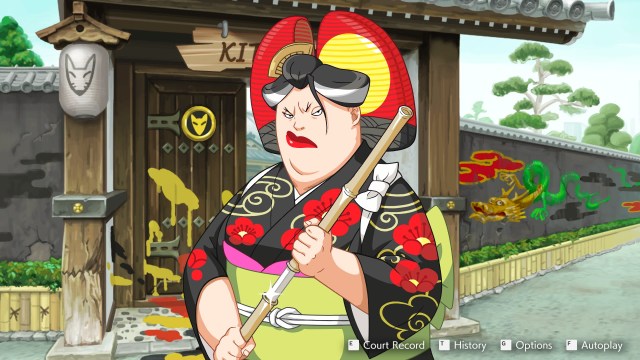
That being said, the side characters are a treat. We have foxy-looking gangsters, fortunetellers with amnesia, and attorney twins. Each character is immediately distinct, from their appearance to their over-the-top personas. The characters are easily the highlight of the game.
Apollo Justice: Ace Attorney Gameplay
The cases in Apollo Justice Ace Attorney tend to follow a Wonderland logic, proving that Occam’s Razor is really just a theory. But once you have a grasp on that, it becomes easy to guess the outcome of any trial. The remaining mystery lies in figuring out the convoluted steps to the murder and misdirection. But ultimately, Apollo Justice is more visual novel than game, and the joy is in the ride.
“The cases in Apollo Justice Ace Attorney tend to follow a Wonderland logic, proving that Occam’s Razor is really just a theory. “
You’ll begin each case by witnessing a murder, depicted in a slow, slideshow-like cutscene. You’ll then be hired by the person accused. From there, you’ll need to investigate several environments, gather clues, make inferences, and speak to anyone who happens to be nearby. The investigations are marked by moving slowly between scenes, using an invisible map. If you want to get to the clinic, for example, but you’re in the park, you’re going to have to make your way through the city scenes until the clinic is in reach.
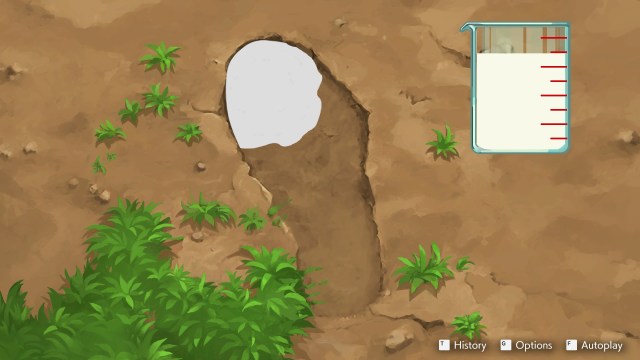
But the monotony of moving between scenes is broken up by the ridiculous characters you’ll meet along the way. And by the mini-games you’ll occasionally encounter. These mini-games aren’t particularly difficult. In fact, they’re obscenely easy. But it was relaxing, and it makes investigations much more interactive.
The trials are all enjoyable frolics through the ludicrous, and they’re all structured similarly. You’ll get witness testimony and the opportunity to poke holes in their statement by pressing the witness for more information, objecting, presenting contradictory information, or submitting evidence that catches them in a lie. Apollo Justice also has a magical bracelet that lets him use “Perceive” when a witness lies. These lies are usually indicated by a habitual twitch or fidget.

By and large, the trials require you to catalog a decent amount of information, and your success in the case will depend on how well you recall the facts. To that end, having a “summary” of the investigation would be a benefit to players who don’t intend to play chapters all in one go.
In general, Apollo Justice Ace Attorney suffers from a gameplay pacing issue. A significant amount of investigation time is dedicated to explaining the game in early trials, heavily hinting at a clue, or talking. And while there’s no debate that all courtrooms are full of professional, full-time yappers, from a gameplay perspective, it can occasionally get boring, if not outright condescending. Because Apollo is a freshly barred attorney, he’s constantly plagued with insecurities and is endlessly hit with disparaging remarks.
But beyond that, the cases are interesting because they’re so silly and over the top. This, combined with the characters, makes Apollo Justice: Ace Attorney an approachable, lighthearted game you can sink over a dozen hours into. I’d highly recommend it as a game you bring with you on a long flight or while you’re commuting on the metro.
Ace Attorney – Dual Destinies
Dual Destinies offers significantly more content than Apollo Justice: Ace Attorney, with five cases and a special episode to tackle. It also feels like it has a much bigger budget, with Dual Destines blending animation with the traditional trial and investigation setup. The cutscenes aren’t significantly different from the originals that played out on Nintendo 3DS, if they’re changed at all. But they do add an immersive quality to the game that Apollo Justice Ace Attorney didn’t have.
But beyond certain tweaks, Dual Destinies is the weakest in terms of narrative and gameplay. From a narrative perspective, the flow of the game is very similar to Apollo Justice: Ace Attorney, with each case contributing towards the overarching plot. And much of that story focuses on Athena Cykes, the newest attorney to join the Wright Office at law.
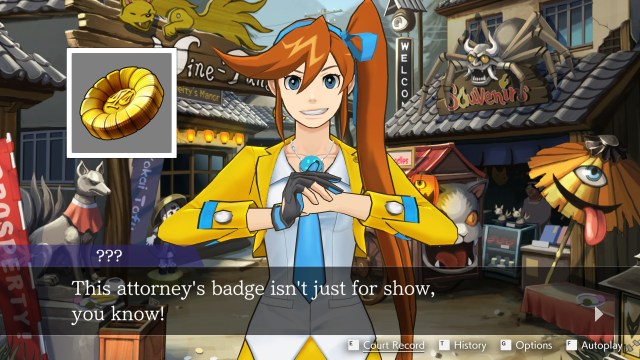
Where Dual Destinies truly deviates from Apollo Justice is its commitment to darker themes. Yes, somehow darker than murder. And while I can’t delve into those themes without spoiling (and breaking review instructions), a particular character’s reactions fail to meet the weight of the situation, and the foundation for a particular case is completely absent. The overall effect is that, while the case is surprising, it doesn’t give the player any strong emotional connection to the character or their circumstance. Thus, the game’s ending and story fall flat.
Ace Attorney: Dual Destinies Characters
Like its predecessor, Dual Destines has an ensemble cast, with all the quirks and eccentricities of a roadside circus. But Dual Destinies also introduces Athena Cykes, a teenage prodigy in both law and science. Apparently, the Japanese legal system is absolutely stacked with genius teenagers.
Despite her high energy, I found it hard to like Athena. She’s as spunky as Trucy, but lacks the charm. In many of her interactions, she feels like the class clown at the back of class, desperately trying to get everyone’s attention, or the girl who studied abroad and can’t stop talking about how it changed her life.
What Athena does offer is a new mechanic to gameplay using her Widget to help gauge the psychological state of witnesses. This is undoubtedly better than Apollo’s ‘Perceive’ ability, just from a narrative standpoint.
Beyond Athena, the characters of Dual Destinies are delightfully silly. They lean into their archetypes, often with small twists, and their character animations add to their life. Jinxie, a character you meet early on, will slap you with a shrine charm to try to banish you, for example.
Each character feels tailored to their location and trial, and they fit together like puzzle pieces in a self-contained world. There are characters inspired by Japanese folklore, an entire pirate crew complete with an orca. A character reminiscent of a stone bust of Aristotle even makes an appearance. The characters beyond Athena are a highlight of the game. If there’s one place you can never fault an Ace Attorney game, it’s in their side characters and environments.
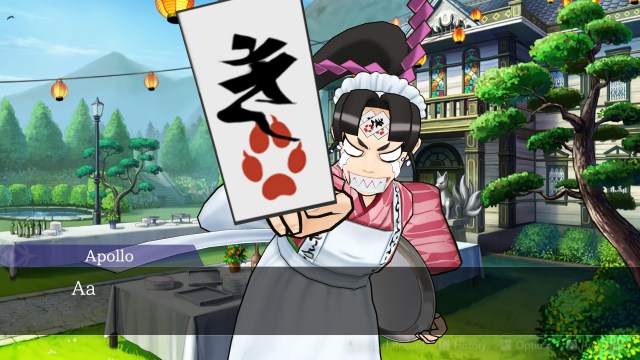
That being said, there are multiple moments in Dual Destinies where the opportunity for deeper storytelling presents itself but gets completely fumbled.
Returning to Jinxie, for example, we find that her father’s on trial. But, despite hours’ worth of conversation, we never get what feels like a sincere, genuine relationship between the two. Too much of the dialogue is instead focused on creating and explaining the Tom and Jerry-style murder plot.
Ace Attorney – Dual Destinies Gameplay
The gameplay in Dual Destinies, like Apollo Justice, is split into two categories: investigation and trial. The gameplay in the investigation portion is scant. Dual Destinies improves on Investigation with the ability to turn the flat scene of the crime 3D. You can press a button to change the perspective of a room, allowing for more creative avenues to commit murder.
However, beyond this, it’s more of a button clicker. You’ll go through a character’s dialogue in one location, get told to speak to someone in another location, move to that location, and repeat. Where it’s improved over Apollo Justice is that now there’s a “home” screen for investigations, which makes it easier to travel from scene to scene. It can be tedious, but the unique cast breaks up the slog.
The trials were a downgrade from Apollo Justice Ace Attorney purely from a gameplay perspective. There are huge swaths of time where the case unravels as dialogue, with no input from the player. When gameplay does occur, it’s scant but not innovative compared to Apollo Justice: Ace Attorney. In fact, one trial felt like it was solving itself, leaving me feeling more like an onlooker than a defense attorney.
It scarcely helped that my least favorite character, Athena, was central to many of these cases. But her Psychology Widget ability did add a little interaction to the trials, which can only be a positive.
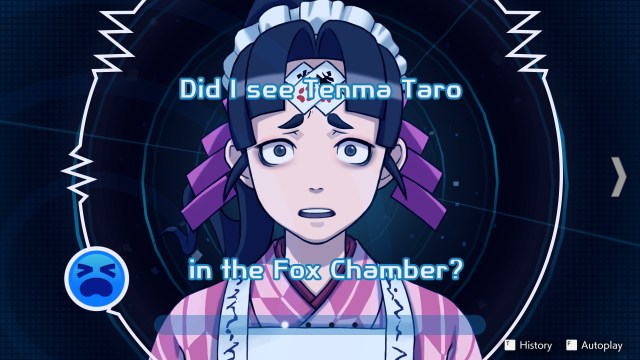
These cases tend to run long, especially compared to Apollo Justice, with each one taking around five hours to complete. This is also true of the special episode, which isn’t just a brief dabble in an offshoot story but a full case.
Regarding narrative and gameplay, Dual Destinies is the weakest game of the three. And while it does build on the reoccurring cast and continuing threads of worldbuilding that appeared in Apollo Justice, its gameplay was such a massive letdown I couldn’t recommend this game as a standalone. That being said, you should still play it, if only because it helps lay the foundation for the next game.
Ace Attorney: Spirit of Justice
Ace Attorney: Spirit of Justice offers five episodes and a DLC special episode. The Apollo Justice: Ace Attorney Trilogy started strong with a weak middle. But in Spirit of Justice, we get the best game of the three. It’s the best looking, the most improved, the most interactive.
The beautiful set pieces are the best in the trilogy so far, alternating between a Tibet-inspired city full of Buddhist iconography and a bustling cityscape.
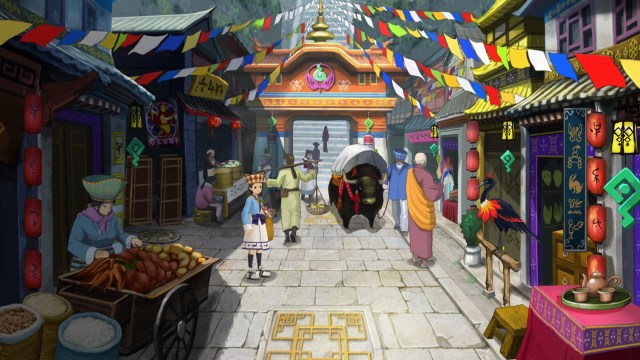
Out of every locale in the trilogy, I was most enchanted by the Kingdom of Khura’in, land of spirit mediums and mystery. It’s here that Phoenix arrives alone at the behest of Maya Fey, a spirit medium he used to work with.
Our three stooges, Apollo, Athena, and Trucy, remain in the city. But despite the split between the locales, this sprawling game knits the two stories together, culminating in a final trial that hits all the markers. There’s drama, intrigue, reunions, and plenty of secrets that are finally revealed. And, of course, the guilty get what’s coming to them.
Then, there are the small world-building details. There are reoccurring memes that started all the way back in Apollo Justice and continue into Spirit of Justice. And then there are small details like Trucy receiving flowers from friends she had in the first and second game. It’s a thoughtfulness that shows that Spirit of Justice was, in many ways, a labor of love.
That’s not to say that it’s a story without flaws, far from it. The Kingdom of Khura’in, for example, offers so much potential which isn’t fully realized. The game only offers brief pockets of narrative in this city, making it feel small, even backward. And that can be said for every location, as we spend so much time jumping from place to place. While this might serve a grander purpose, it means that the narrative structure is weakened.
Ace Attorney: Spirit of Justice Characters
But beyond the narrative, we get to see the maturation of our very young protagonists. Trucy, Apollo, and Athena have all gained important experience over the course of Ace Attorney: Apollo Justice and Ace Attorney: Dual Destinies. And each character is so much better for it. Apollo is less bumbling and insecure. Trucy has not only matured but shows true character depth and dimension.
Of course, Spirit of Justice also has an odd troupe of weirdos to fill its investigations and trials. There’s groovy Jesus, a woman who looks uncannily like a magician’s rabbit, and a clown that was briefly made into a meme because of where she likes to store her balloon.
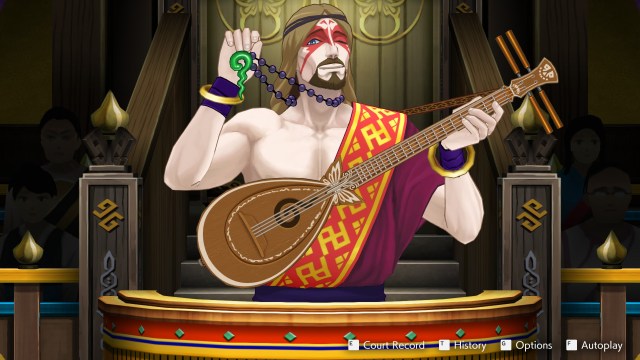
But where Spirit of Justice struggles is in its newly introduced heroine, Princess Rayfa. Despite having a cutscene and winning character design, Princess Rayfa gets precious little in the way of character development. Especially when compared to Athena in Dual Destinies. But this is due to how the game is paced, with Rayfa only appearing in three cases total. That doesn’t give us much time to get to know her, and so there’s no real opportunity to grow attached to her or see her character develop.
Ace Attorney: Spirit of Justice Gameplay
And because half the game is set in a different country, we get a brand-new courtroom and judge, which is significantly more ornate. We also get new characters and new gameplay mechanics. Most notably the Divine Séance, performed by Princess Rayfa. This mechanic, which even gets a bit of voice acting, calls upon the dead to provide insight into their final moments. This takes the dying declaration heresy exemption to a whole new level.

The Divine Séance provides an image and a handful of words that pertain to the case. In many ways, it is like Athena’s psychology mechanic, which allows you to parse through a scene. Though we also get Athena’s mechanic in Spirit of Justice as well. Divine Séance is easily the most complicated mini-game in the trilogy and requires a little more button finesse, though nothing overly taxing.
Beyond that, Spirit of Justice offers the toughest cases yet. Each case you tackle is set up in a way that seems, at first blush, impossible. And while it’s still very easy to guess the murderer in each case, working backward to ascertain the method is much harder than in previous games.
And while it’s a joy to tackle Gordian’s Knot, it means that the cases sprawl. Cases in Spirit of Justice can take upwards of six hours, with some almost hitting eight. This is true even for the special episode, which will take five or more hours.
What Spirit of Justice does best, however, is pacing. While Dual Destinies was essentially an anime that occasionally asked me to hit a button, Spirit of Justice was much more engaging. We also use the trial mechanics we’ve gathered throughout the trilogy: Apollo’s Perceive, Athena’s Psychology, and Rayfa’s Divine Séance.
Of course, we also get our traditional courtroom while we’re in the city. But there’s not much difference compared to Dual Destinies and Apollo Justice.
The Last Game is Always the Best
When it comes to trilogies, there’s an unspoken rule. The first must be strong, and the last has to be great. And the second, well, it just has to connect the two. And that’s certainly the case for the Apollo Justice Trilogy.
While I wasn’t wowed by Ace Attorney: Apollo Justice, it’s a solid game and a great jump point for those new to the series. Dual Destinies floundered because of its lack of gameplay, though its cases and characters were certainly more interesting than its predecessor. Spirit of Justice finally starts refining the formula, though it doesn’t quite perfect it.
Still, it’s easily the best and most enjoyable of the series, and its narrative makes the journey through the trilogy satisfying in the best way.
Ultimately, the Apollo Justice Trilogy is perfect for those who’ve never played the game but enjoy lighthearted puzzle games. There’s humor to all the cases despite all the murders. And for veterans of the series who are wondering if it’s worth picking up, the answer is likely yes. There isn’t a significant amount of new content beyond access to the DLCs, concept art, and music. But for three games and well over one hundred hours’ worth of content, it’s not a bad nostalgia grab.

- Ridiculous cases that are fun to solve.
- Memorable characters.
- Lighthearted gameplay.
- It's very easy to spill hours into.
- Gameplay can be scarce.
- Character development and story are sometimes sacrificed in favor of explaining convoluted cases.





Published: Jan 22, 2024 10:00 am